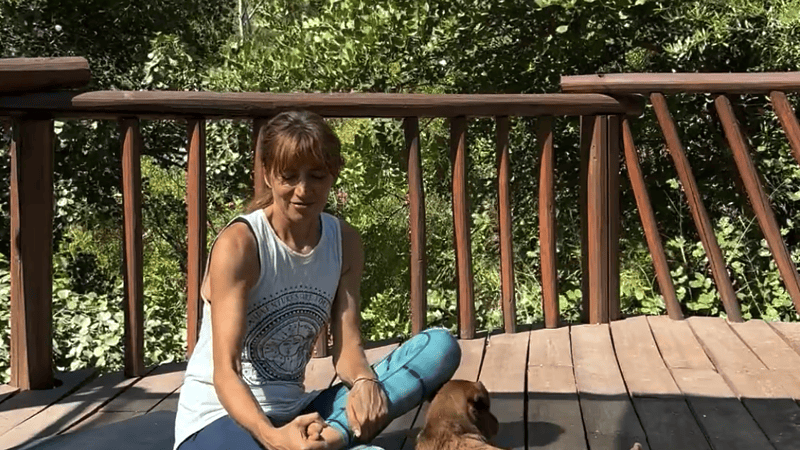7 science-driven, wisdom-inspired thrive hacks to banish stress for good and flourish, by Nick Seneca Jankel
A little stress stimulates us to dig within for new ways to grow. This has been termed ‘eustress’ (eu as in eudaimonia: happy, positive). But too many unresolved problems will often lead to distress. When we are under constant low-grade distress—and it’s estimated that over 80% of us are all the time—this begins to hurt us. When we are stressed, our nervous system tightens up and we lose our creativity, which stops us learning; and if we aren’t learning, we aren’t growing. Stress corrodes the curiosity and courage we need to experiment with the new. It is almost impossible to play big in life if we are scared of looking like idiots, going bankrupt, or being rejected. Stress kills creativity and kills us too.
Whether stress is due to worry, fear, confusion, over-work, or being overwhelmed, if we let our powerful biological stress response dominate our everyday lives, we may survive to pass on our genes… but we are unlikely to thrive as we do so. When we enter the stress response, nobody has injected us with cortisol or adrenalin. Someone or something threatening us, annoying us, or even hitting us doesn’t cause our mind and body to enter a stress response. It triggers it. The stress is already within us, waiting. If we feel any stress inside us, then the only way to transform it is to become responsible for it. This doesn’t mean we are to blame. It simply means that our stress is our own, and the only way to change it is to change something within. Here are seven ways how:
1 Breathe & bounce
When we are stressed, adrenaline gets pumped throughout the body, increasing our heart rate and making us breathe fast and shallow. Just one, easy deep breath – ideally from your stomach, not your neck – will reset the system a little and shift you toward relaxation. Try it right now. Stress also tends to leave a build-up of energy within that keeps us out of balance. A great way to discharge it quickly (so we don’t turn the charge into anger or fear) is to shake, jiggle or dance it out. Even a one-minute nano-rave in your bedroom or the toilet at work will have a massive impact on your stress levels.
2 Get curious
Your upper brain contains, amongst other things, your prefrontal cortex – which is in charge of attention, motivation and executive thinking. It doesn’t work very well when under stress. In fact, we have to wait until we’re calm before it provides us with its wisdom. So when under stress, our body-mind relies on habit rather than engaging in the moment-by-moment act of pure creativity. As you breathe deeply, actively choose to engage your upper brain. A great way to do this is to get really curious about why you are feeling stress. This shifts you into reflection rather than rumination
(when we toss worries around our mind over and over again).
3 Hug it out
Give someone (or simply yourself) a hug. Hugging releases oxytocin, which reins in our stressed-out sympathetic nervous system and drives the repair of brain tissue and neurones. So find someone you love or like and ask them for a hug. See if you can hug for over a minute, which really gives your system a chance to chill out.
4 Meditate
The insula in our brain integrates information from the brain and body. Advanced meditators, experienced warriors, and top athletes have a highly developed insula. They share a heightened ability to sense what’s going on in their bodies and act on it. The insula can even be directly stimulated to create feelings of ecstasy, bliss, and oneness with the universe. Just a few minutes of meditation each day, of any sort, can start to have a major impact on the tuning of your insula. Elite soldiers and meditators also have an enhanced vagus nerve, which helps them perform better under stress.
5 Let go of an assumption
If we are feeling stuck or stressed-out, it’s often because we have not yet realised that some belief or habit within us is past its expiry date. So if we want to destress, we have to let go of an idea, belief or story. At the heart of each of these is usually an assumption about ourselves or the world that is no longer relevant, useful or appropriate. Time to let it go.
6 Gratitude attitude
Being grateful, even for tiny things like the fact that strawberries exist, can short-circuit your stress response, stopping you reacting negatively and opening you up instead. For example, you might be grateful for your health; a child’s eyes you saw on the street today; your own existence against all the odds of nature; the heart that pumps to keep you alive and the brain that works tirelessly to engage with the world; salted peanuts; your Converse shoes; the sound of deep house music; birdsong; air travel; the art of Banksy or Botticelli; or the smell of fresh bread. What are you feeling grateful for right now? List 20 things in 60 seconds.
7 Feel the love
If you can’t let it go, feel grateful or move through it, it is time to reconnect with your heart. Feelings of love and connection —all underpinned by the biology of oxytocin, the insula, prefrontal cortex, vagus nerve, and more— melt away stress. Love is the great synaptic solvent that liquefies old stressful beliefs, assumptions and habits (and the neuronal pathways that encode them), allowing relaxation, energy and creativity to burst free. Reconnect your heart and you can rewire your brain to think in a new way – one that doesn’t lead
to stress.
The new book, Switch On: Unleash Your Creativity and Thrive with the New Science & Spirit of Breaththrough by Nick Seneca Jankel, is out now.







